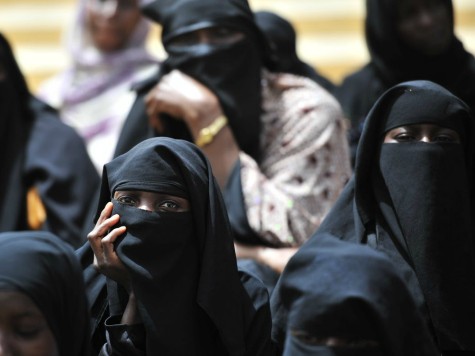
Islamist group al-Shabaab, which controls much of southern and central Somalia, has begun imposing clothing restrictions on women en masse, arresting as many as one hundred women this week for not complying with its fundamentalist dress code.
The BBC reports that al-Shabaab “rounded up around 100 women and ordered them to comply with a strict Islamic dress code or risk being whipped.” The women were arrested in a market in Buale, a town southwest of Mogadishu. According to those reports, the women were detained for a short time and threatened with whipping should they not comply with al-Shabaab and wear a niqab – the more involved head covering which leaves open only space for a woman’s eyes. The women, BBC reports, were released because it was their “first offense,” but they were warned that a second such arrest would result in physical abuse. Dress code for Islamist militants in the area, BBC adds, becomes more difficult to impose as the weather turns warmer, with summer heat reaching extremely high temperatures.
Al-Shabaab has been attempting to overtake Somalia and neighboring countries since its major victories in southern Somalia in 2006. The National Counterterrorism Center describes the coalition as “a clan-based insurgent and terrorist group,” one that is not monolithic and often experiences disagreements and struggles for power among its leadership. In addition to conducting terrorist activity and threatening neighboring states, al-Shabaab is largely responsible for extreme conditions within Somalia, including the high threat of famine. The group often uses violence to prevent humanitarian groups from entering regions of the country that are plagued with famine and disease, exacerbating the threat of mass deaths in a nation in which 50,000 children are believed to be experiencing extreme hunger and famine.
Despite its fragmented nature, it has been able to cause major disturbances through bombings and attacks on cities in Somalia and elsewhere. Most notably, al-Shabaab extended its targeting of the nation of Kenya in 2014. Kenya began targeting the group in Somalia in 2011 and in May returned to the country to attack key al-Shabaab locations, including one believed to be a residential compound, after a bombing in Nairobi killed twelve. Al-Shabaab responded to the attacks with threats that the group was redirecting its attention out of Somalia and to Kenya. “We have transferred the war to inside Nairobi,” warned senior al-Shabaab official Fuad Mohamed Khalaf in a video released by the group. Khalaf promised Kenya “Muslim teenage suicide bombers, explosions and battles.”

COMMENTS
Please let us know if you're having issues with commenting.